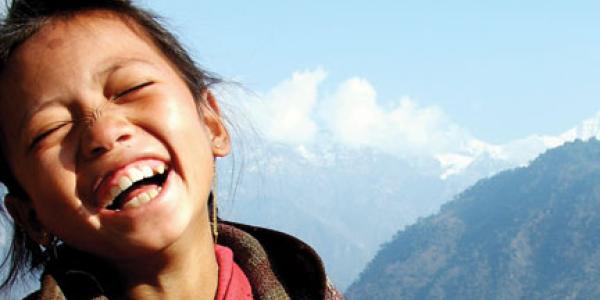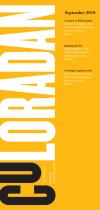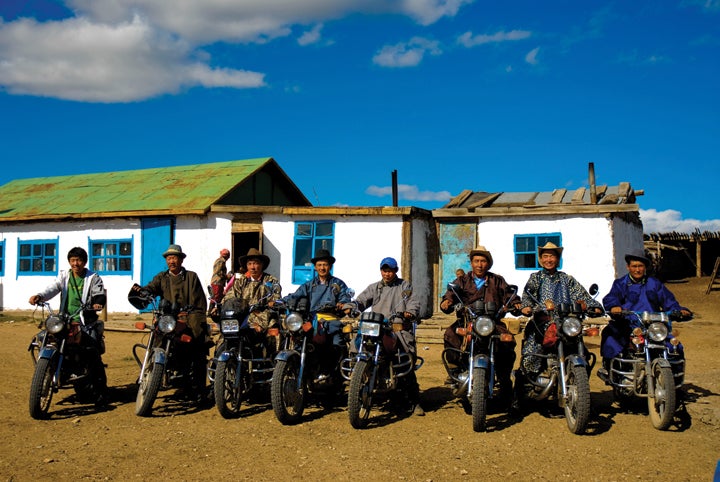
“The Steves” are invited to a wedding in the countryside of Mongolia outside of Ulan Bator, the capital, and this “biker gang,” as they call it, is also in attendance.
When Toyota and Stevinson Toyota, a Denver dealership, and other businesses decided to underwrite Steve Bouey’s (PolSci’99, MPubAd’01) and Steve Shoppman’s (Fin’00) ambitious plan to literally drive around the world, they were probably looking for a little positive public relations.
So just imagine what the sponsors thought when they received photos of the pair sitting cheerily with Congolese rebels in central Africa — territory on the U.S. State Department’s “do not travel” list.
“We camped with them and we sent Toyota these photos of guys sitting next to us with AK-47s,” says Bouey, 32, with a chuckle. “I guess they were probably surprised.”
But then, “the Steves” themselves were constantly, pleasantly surprised on their epic two-year, 147-day journey that took them 77,000 miles across six of the world’s seven continents. The journey began in New Zealand after two Toyota trucks had been shipped by boat from California. It included treks across the vast, empty outback of Australia, plunges into the jungles of Laos and Cambodia, as well as China, Eastern Europe, Norway, where they reached the Arctic Circle, descended into Africa and then motored north from South to North America. And since their trusty Toyotas could not swim, the adventure included three boat trips — from New Zealand to Australia, Australia to Indonesia and South Africa to Argentina.
Not long after embarking in 2007, they realized the trip to 67 countries was more than just the adventure they had initially conceived.
“The trip started out as something completely selfish, just to satisfy my curiosity about the world,” says Bouey, who worked in the Denver state auditor’s office for six years before taking the trip.
“The only thing most people know about the rest of the world is what they see in the news, and it always seems to be the worst thing ever,” says Shoppman, 31, a Denver-based graphic designer. “But 99.99 percent of the people in the world are pretty good human beings.”
Take, for instance, the nomads they met while roaming the high steppes of Mongolia. Traveling outside the country’s main city, Ulan Bator, they discovered people living a life “not much changed from the days of Genghis Khan,” Bouey says.
Arriving in a 2007 Toyota Tundra and a 2004 Sequoia — worth more money than the nomads make in two or three generations, Bouey says — and hobbled by an insurmountable language barrier, the Steves were welcomed as fellow travelers.
“There is an unwritten nomadic code that you take care of people because you might need help yourself some day,” Shoppman says. “They invited us to stay inside and fed us. We couldn’t communicate very well, but with handshakes and smiles we made do.”
“I don’t know if you were backpacking in the U.S. how many people would willfully open their door to a complete stranger, invite them to eat with the family and pitch a tent in their backyard,” Bouey says.
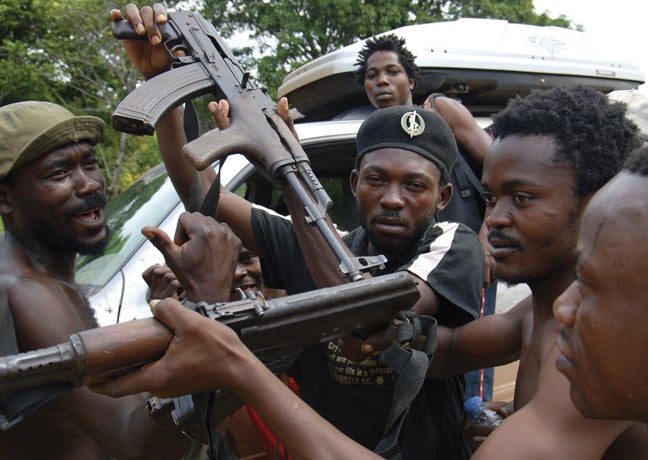
After they explain the concept of “tourist,” “the Steves” get along well with these central African rebels toting AK-47s. They are in a part of the Republic of the Congo that is on the U.S. State Department’s “do not travel” list.
Even Congolese rebels welcomed the pair — once they explained the concept of “tourist” in halting French, a task that took 20 minutes.
Hospitality was the rule almost everywhere they went, although the Steves agree that people who live in the countryside are friendlier than those in the cities. After giving a group of Buddhist monks in Thailand a lift, Bouey and Shoppman were invited to stay in their temple.
Along the way the two received the help of some 30 crew volunteers from many nations, typically six at a time, who learned of the trip from Craigslist and YouTube. Bios for 22 crew members — including a monkey doll named Swinger that was photographed at exotic locales around the globe — can be found at www.theworldbyroad.com. Crew and volunteers helped drive, set up camp and essentially became part of the journey for a few days, weeks or months at a time.
“People submitted information to sign up,” Bouey says. “Ultimately the people we picked were the people we felt we could get along with.”
When asked, both Bouey and Shoppmann say they would be willing to visit any place on their itinerary again. But when pressed, they grudgingly acknowledge two countries that left them a little cold. The former Soviet republic of Kazakhstan was an unfriendly, crime-ridden society where “you either have millions in the bank or you don’t know what a bank account is,” Shoppman says. Someone smashed a truck window and stole their cameras and other equipment. They also didn’t appreciate being “shaken down” for money every 30 or 40 miles while traversing Honduras.
But most of the people and cultures were so welcoming that the Steves say they wish more Americans experienced the world as something other than “us vs. them.” They note that just 20 percent of Americans have a passport and only a puny 5 percent have crossed an international border.
“The world is completely different from what average people think,” Bouey says. “Most people get a skewed media view.”
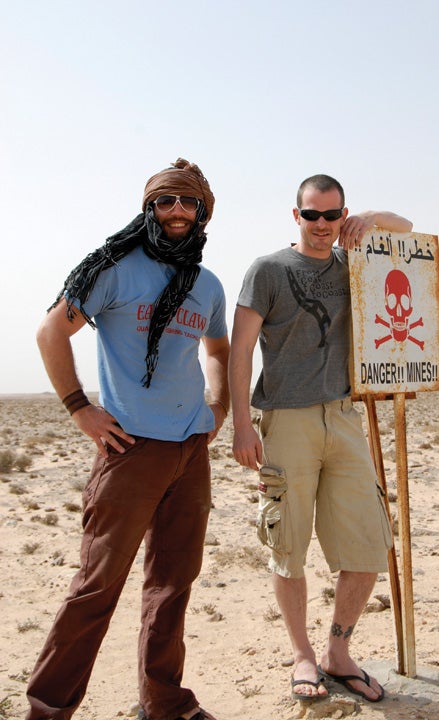
Steve Shoppman (Fin’00), left, and Steve Bouey (PolSci’99, MPubAd’01) navigate a minefield in the western Sahara Desert during their trip around the world.
The pair returned home with a deeper appreciation for the opportunities afforded them, shadowed by concerns that Americans don’t always appreciate what they have, and not just materially.
For example, they visited a Swedish aid project where Laotians were learning how to be journalists. Journalism, as historically practiced in the communist Southeast Asian nation, was a sham — government-written propaganda read word-for-word over the radio and published in newspapers, say the Steves.
“These people were so excited to learn,” Shoppman says. “They wanted to build their country, make it a great place.”
But Americans, he says, are moving in the other direction, listening only to views with which they agree instead of questioning.
“We have had a free press for hundreds of years,” he notes. “We have this freedom of speech — take advantage of it.”
They realized their privilege of even pondering such an adventure in a world where billions live on the equivalent of $2 a day. Driving 4x4s around the globe might seem extravagant, and indeed, some criticized them for burning fuel and adding carbon to the atmosphere.
But one of their sponsors provided “carbon offsets,” they say, and in the end, their net resource use was less than what it would have been staying home.
“We were driving the trucks, but we were living in tents, sharing resources and food,” Shoppman says. “Per person, we were emitting half as much carbon a year as the average person [in the U.S.].”
Shoppman and Bouey say the trip has changed them forever. Although returning broke in the middle of the worst economy in 70 years forced them to take “regular” jobs, they hope to use the expedition as a launching pad to educate more Americans about the world. Each is writing a book about the experience and they are working on a joint video and speaking to schools, service clubs and elsewhere. They hope that The World by Road will become a true vocation — they want to take people on trips to unexpected places.
“We can help change the perception that the world is a horrid place,” Shoppman says, “or that we need to be sending troops everywhere.”
Travel is often thought of in the U.S. as “escape, screwing around, avoiding reality,” Bouey says. But both men say there is a growing hunger for engaging with the world on a deeper and more genuine level. Bouey often refers to “walkabout,” the ancient Australian aborigine rite of passage in which young men leave home to live in the wild, returning with new knowledge to help the community.
After their own “driveabout,” the two men seem almost at a loss for words when asked about the wisdom they bring back. The lessons are too broad, too deep to be easily summed up but include: don’t be afraid of what you don’t know, people really are the same everywhere and appreciate what you’ve got, whether it’s clean water or a free press because billions of people in the world don’t have it.
“The U.S. is great — don’t get me wrong,” Bouey says. “It gave us the means and resources to take a trip like this. But people here take for granted a lot of the opportunities they have. If Americans visited other countries where the opportunities are few and far between, they might think differently.”
Photos by Steve Bouey and Steve Shoppman.



